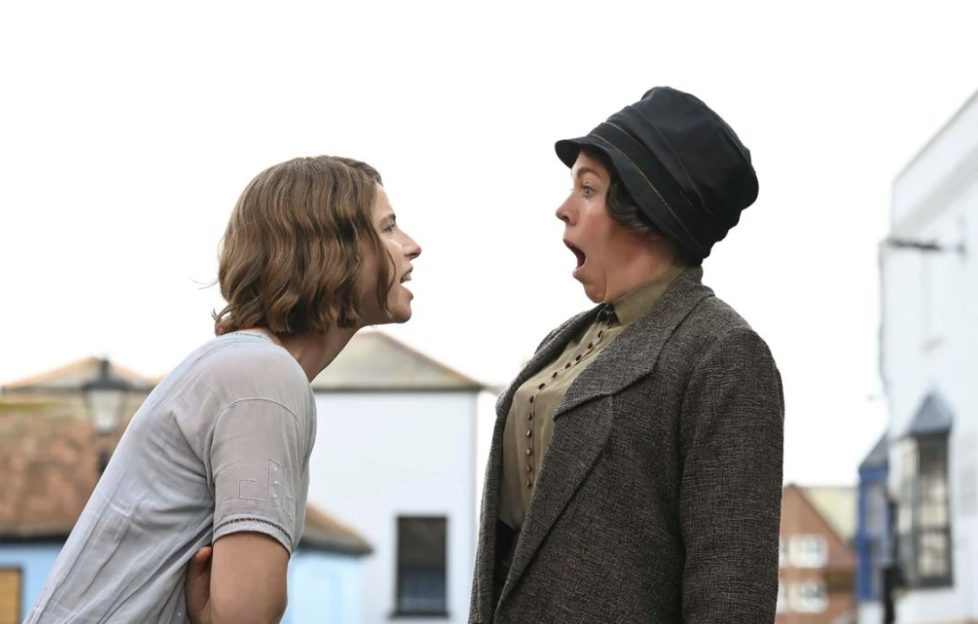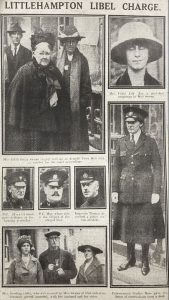Wicked Little Letters: The True Story Behind The Latest Film Starring Olivia Colman

You can now watch Olivia Colman’s latest film Wicked Little Letters on Netflix, and it’s based on a scandalous true story!
Olivia Colman plays one of several people in a small English seaside town targeted by anonymous, obscene mail in the 1920s.
The movie is based on a true story and the script’s profanity was lifted straight from the real ‘Littlehampton letters’. The language used was so shocking that it was even debated in Parliament.
Edith Swan (Olivia Colman) was a devout Christian woman still living at home with her parents. The papers called her a ‘respectable spinster’.
In real-life, Rose wasn’t Irish, she was born in Lewes. However, in the movie, Rose Gooding (Jessie Buckley) was a loud and outspoken Irish immigrant who moved to Littlehampton with her daughter, where she struck up an unlikely friendship with neighbour, Edith.
Edith handwrote a recipe for chutney and lent Rose knitting patterns for socks, while Rose lent Edith a tin bath.
But these friends quickly became enemies after a major falling out over their communal garden where Rose often had loud arguments with her husband. It was then that all the drama began.
Once, Edith started receiving the poison pen letters, the finger was immediately pointed at Rose. She loved to shout and swear and let her true (often rude) thoughts be known, so who else would it be?
SPOILERS AHEAD
In the movie, it’s Edith’s father who calls child protection services on Rose, however, in reality it was Edith who wrongly accused Rose of mistreatment. It also wasn’t for her hurting her daughter, Dorothy, but for ‘ill-treating her sister’s baby’.
Although she does not appear in the movie, Rose’s sister and children also lived with Rose and her husband. Rose also had a son who wasn’t written into the script either.
Rose was blamed entirely for the letters and was accused of harassing the whole town when the vulgar writing began targeting other members of the community.
She really did spend three months in prison separated her from her children, and as soon as she was released and returned home, the letters resumed. This led to another conviction and this time it is was 12 months in jail with hard labour.
While Rose was in prison, a notebook filled with obscenities in the same handwriting as the letters was discovered. This raised suspicions for the first time because if Rose was in jail, there was no way she could still be writing the letters.
Scotland Yard sent the eminent detective Inspector George Nicholls to investigate. Rose’s barrister and policewoman Gladys Moss also suspected Rose was the victim and not the culprit.
They wanted to clear her of all charges and get her back home to her family, so they went to great lengths to prove her innocence.
The authorities finally started paying closer attention to the handwriting in the letters, and they finally noticed a striking resemblance to Edith’s penmanship.
Rose’s barrister shared a sample of Edith’s handwriting, the pages of knitting instructions and the chutney recipe, with the court. In the movie, Edith’s signature on a death certificate and a hand-painted sign she created for a shop front more cinematically connected the dots.
But in both cases, the judge and the jury’s biases against Rose meant they just couldn’t begin to imagine how such a well-mannered woman as Edith would be capable of writing those foul-mouthed letters.
Although dramatised for comic relief in the film, Police officer Gladys Moss was involved in the sting operation to catch Edith in the act. The plan was to mark a set of stamps with invisible ink and ask the post office to sell them to Edith when she entered.
Edith was caught red-handed posting a poison pen letter using the marked stamps that the police planted.
Later that same year, Edith was finally found guilty and was sentenced to 12 months in prison. Rose’s name was cleared.
In the real-life version of the story, it’s harder to sympathise with Edith who appeared to really have it out for Rose.
However, modern day historians believe Edith was likely suffering from mental health issues as it was questioned at the time whether she was ‘in her right mind’ when she sent the letters.
In the film, Edith’s behaviour was the result of the trauma caused by her emotionally abusive father. Given the time period, it’s quite possible that this is still true and it just wasn’t documented.
Sometimes fact is stranger than fiction and Wicked Little Letters is a brilliant example of that.
Dig deeper into the Littlehampton letters libel case over on Find My Past
- Olivia Colman discusses the gender pay gap, saying she knows that she would be getting paid more if she was a man
- Read more from our TV & Film section





